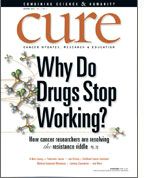Publication
Article
CURE
Late Effects & Premature Aging After Pediatric Cancer
Author(s):
A recent report notes that certain health issues observed in young adult survivors are typically seen in much older individuals.
Can treatment for childhood cancer result in premature aging? A recent report in the Journal of the American Medical Association seems to suggest so, noting that certain health issues observed in young adult survivors are typically seen more commonly in much older individuals.
"We definitely are seeing a pattern of organ dysfunction that suggests premature aging,” says Melissa M. Hudson, director of the cancer survivorship division at St. Jude Children’s Research Hospital in Memphis, Tenn., and lead author of the report. “Our responsibility is to understand how to remediate or prevent these effects.”
To reduce the risk of premature aging, Hudson adds, researchers must understand which systems are affected and then determine if there are interventions that can prevent further decline. “Intervention is a big area of research in the St. Jude Lifetime Cohort Study,” she says. “We are looking at a spectrum of interventions that aim to promote healthy aging, including behavioral and pharmacologic methods.”
Yet another intriguing area of research involves the role of telomeres, which are repetitive DNA sequences at the ends of our chromosomes that protect genetic material. Telomeric DNA shortens slightly every time a cell divides, ultimately leading to telomere dysfunction. Some researchers believe dysfunctional telomeres contribute to aging.
“We have done studies with normal cells and cancer cells, and clearly chemotherapeutic agents, as well as radiation, cause telomere dysfunction,” says Lynne W. Elmore, associate professor in the department of pathology at Virginia Commonwealth University in Richmond, Va.
In a report published in The International Journal of Biochemical & Cell Biology, researchers in Sweden treated normal human T lymphocytes and fibroblasts with chemotherapeutic agents and noted a significant shortening of telomeres and downregulation of telomerase, the enzyme that maintains telomeres in the vast majority of cancer cells and stem cells.
The researchers also cited earlier studies suggesting people with cancer who receive chemotherapy have shorter telomeres in their blood cells, which could result in late effects manifesting during cancer survivorship.
“We know that radiation and chemotherapy cause oxidative damage. Oxidative damage contributes to aging, and telomeres, due to their chemical composition, are particularly vulnerable to oxidative stress—so this makes sense,” Elmore says. “But it is important to recognize that these concepts are supported largely from experimental data. While conceptually appealing, longitudinal patient-based studies are now needed to rigorously test this working model.”





